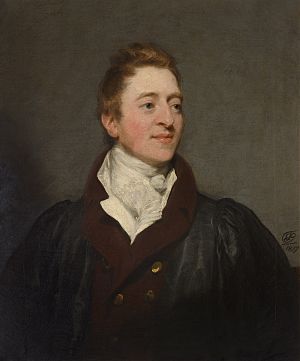Hugh Percy, 3rd Duke of Northumberland facts for kids
Quick facts for kids
The Duke of Northumberland
|
|
|---|---|

Portrait by Thomas Phillips, c. 1817
|
|
| Lord Lieutenant of Ireland | |
| In office 22 January 1829 – 4 December 1830 |
|
| Monarch | George IV William IV |
| Prime Minister | The Duke of Wellington |
| Preceded by | The Marquess of Anglesey |
| Succeeded by | The Marquess of Anglesey |
| Personal details | |
| Born | 20 April 1785 |
| Died | 11 February 1847 (aged 61) Alnwick, Northumberland, England |
| Nationality | British |
| Political party | Tory |
| Spouse |
Lady Charlotte Clive
(m. 1817) |
| Parents | Hugh Percy, 2nd Duke of Northumberland Frances Julia Burrell |
| Alma mater | Eton St John's College, Cambridge |
Hugh Percy, 3rd Duke of Northumberland (born April 20, 1785 – died February 11, 1847) was an important British politician. He was a member of the noble class and a Tory politician. From 1829 to 1830, he served as the Lord Lieutenant of Ireland, which was like being the King's representative there. Before he became Duke in 1817, people knew him as Earl Percy.
Contents
Early Life and Education
Hugh Percy was the son of Hugh Percy, 2nd Duke of Northumberland. His mother was Frances Julia, whose father was Peter Burrell. Young Hugh received a top-notch education. He attended Eton College, a famous boarding school. After Eton, he went to the University of Cambridge, studying at St John's College.
Political Career Highlights
Hugh Percy started his political journey in July 1806. He became a member of Parliament for Buckingham. Later that year, he was elected for the City of Westminster. He then chose to represent Launceston.
In 1807, he ran for the county of Northumberland. He won without anyone running against him. He stayed in this role until 1812. At that point, he was called to the House of Lords, which is the upper house of the British Parliament. He joined as Baron Percy.
In 1817, he became the Duke of Northumberland after his father passed away. He took on a special role in 1825. He was the Ambassador Extraordinary for the coronation of Charles X of France. He paid for all the costs himself. People were amazed by his large group of helpers and his generous spending.
In March 1829, he became the Lord-Lieutenant of Ireland. He held this important position for about a year. During his time, the Catholic Emancipation Act was passed. This law gave more rights to Catholics. A famous politician, Robert Peel, said he was "the best chief governor" Ireland ever had.
Other Public Roles
Beyond politics, Hugh Percy held other significant positions. In November 1834, he was chosen as the High Steward of the University of Cambridge. He held this honor until 1840. Then, he became the Chancellor of the university, which is a very senior role.
He also helped start the Church Building Society. This group was important for building many churches in the early 1800s. These churches are sometimes called "Waterloo churches." He suggested forming this society in 1818. The society asked Parliament for money to build churches. Parliament then passed a law and gave a large sum of money for this cause.
The Duke also played a part in the history of football. At a time when the game was sometimes controversial, he provided a field for the annual Alnwick Shrove Tuesday game. He would also present the ball before the match. This tradition continues even today. From 1817 to 1847, he was the honorary Lord Lieutenant of Northumberland.
Family Life and Legacy
Hugh Percy married Lady Charlotte Clive on April 29, 1817. Their wedding took place at Northumberland House. They did not have any children.
The Duke of Northumberland passed away in Alnwick in February 1847. He was 61 years old. His body was laid to rest in the Northumberland Vault inside Westminster Abbey on February 23.
His younger brother, Lord Prudhoe, became the next Duke. In August 1851, a special monument was placed in St Paul's Church in Alnwick to remember the Duke.
See also
 | Kyle Baker |
 | Joseph Yoakum |
 | Laura Wheeler Waring |
 | Henry Ossawa Tanner |

